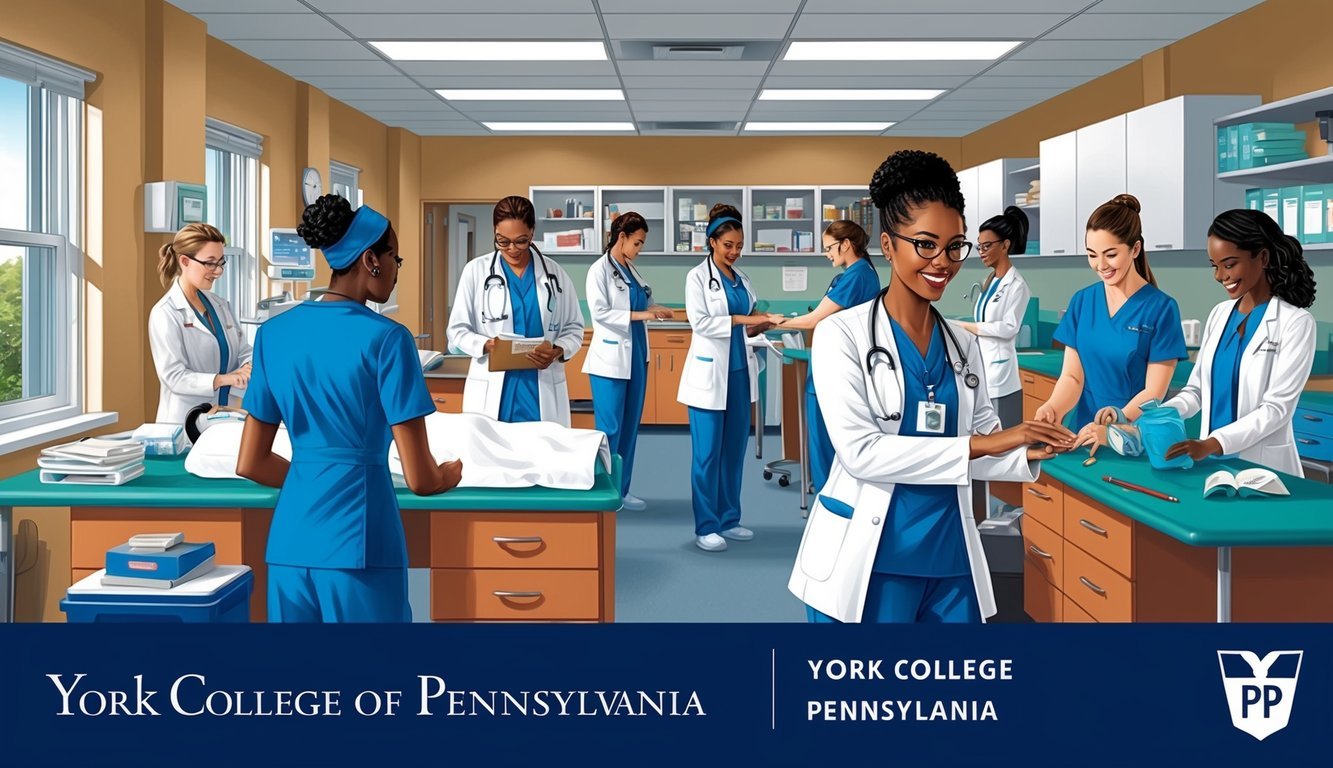Finding the right nursing school is a crucial step in advancing your career in healthcare.
With numerous options available in Pennsylvania, you may wonder which institutions stand out in terms of academic excellence and student support. Exploring the best nursing schools in PA will help you identify programs that can enhance your skills and improve your employability in the nursing field.
These institutions offer various degrees, from Associate in Nursing (ADN) to Bachelor of Science in Nursing (BSN) and beyond.
As you assess your options, consider factors such as program reputation, graduation rates, and available resources for clinical placement and financial aid.
Understanding these aspects will guide you in making an informed decision about your nursing education.
University of Pennsylvania School of Nursing

The University of Pennsylvania School of Nursing is recognized as a leader in nursing education.
It consistently ranks among the top nursing schools both nationally and internationally, with a strong emphasis on research and clinical practice.
Penn Nursing features a highly selective Bachelor of Science in Nursing (BSN) program.
The rigorous curriculum ensures you will be well-prepared for a career in nursing.
You will benefit from access to two teaching hospitals, providing hands-on experience in various clinical settings.
This integration enhances your learning and practical skills.
The school also boasts an impressive NCLEX pass rate, averaging 93% for first-time test-takers over the past decade.
This statistic underscores the program’s effectiveness in preparing you for licensure.
Moreover, Penn Nursing has received the most NIH research funding of any nursing school in the country in recent years.
This funding supports innovative research that often translates into improved patient care.
For more details about the program, you can visit the Penn Nursing website.
2) Drexel University College of Nursing and Health Professions
Drexel University’s College of Nursing and Health Professions offers a robust selection of nursing programs.
You can choose from undergraduate, graduate, and doctoral degrees, catering to various career goals.
The Bachelor of Science in Nursing (BSN) program is a full-time, four-year option.
This includes a six-month cooperative education experience in your third year, which enhances your practical skills.
Drexel’s programs are recognized for their quality, ranking second in Pennsylvania for nursing education according to Nurse.org.
The faculty comprises experienced professionals dedicated to your success.
You can explore the College of Nursing and Health Professions for more details on admissions and program specifics.
This school emphasizes innovation and experiential learning, preparing you to be a leader in the nursing field.
With nearly 85 programs available, Drexel supports interdisciplinary learning, allowing you to collaborate across health professions.
Graduates often note positive career outcomes and strong placement rates in the job market.
3) University of Pittsburgh School of Nursing
The University of Pittsburgh School of Nursing is a leader in nursing education.
It consistently ranks highly among nursing programs nationally.
In the latest rankings, the undergraduate nursing program reached No. 4 in the nation, a significant achievement for this institution.
This ranking reflects the program’s commitment to excellence in education.
The school offers various programs, including the Doctor of Nursing Practice and Master of Science in Nursing.
These programs are highly regarded in Pennsylvania and beyond.
Key rankings include:
| Program Type | National Rank |
|---|---|
| Undergraduate Nursing | 4th |
| Doctor of Nursing Practice | 8th |
| Specialty – Nursing-Anesthesia | 1st |
| Specialty – Psychiatric/Mental Health | 6th |
These accolades underscore the quality and reputation of the University of Pittsburgh School of Nursing.
For more details on their offerings, you can visit their rankings page.
4) Villanova University M. Louise Fitzpatrick College of Nursing

The M. Louise Fitzpatrick College of Nursing at Villanova University is a notable choice for aspiring nurses.
Established in 1953, the college is recognized for its rigorous academic standards and commitment to cultivating strong nursing leaders.
You will benefit from a comprehensive educational experience that includes undergraduate, graduate, and doctoral programs.
The college emphasizes compassionate leadership in various nursing fields, including clinical practice, innovation, and research.
Villanova’s nursing program has been named a Center of Excellence in Nursing Education by the National League for Nursing.
This recognition highlights the quality of education you can expect.
The college recently received a notable philanthropic investment, bringing its funding to over $10 million.
This support enhances resources and opportunities for students, ensuring a robust academic environment.
If you are considering a nursing education in Pennsylvania, the M. Louise Fitzpatrick College of Nursing is a premier option.
You will find a supportive community focused on preparing you for the challenges of modern healthcare.
For more information, visit their official website.
5) Penn State College of Nursing
The Penn State College of Nursing is among the largest educators of pre-licensure nursing students in Pennsylvania.
With more than 2,200 undergraduate and graduate students across 13 campuses, it offers extensive accessibility and resources.
You can expect a student-centered environment with favorable student-to-faculty ratios.
This supportive atmosphere promotes effective learning and individualized attention.
The college has a strong track record in preparing students for the NCLEX exam.
Recent graduating classes have achieved impressive pass rates, demonstrating the quality of education provided.
Programs available include both traditional and online formats, catering to diverse student needs.
As a future nurse, you will benefit from comprehensive training that covers essential nursing practices.
For more information, you can explore the Penn State Nursing website and learn about specific programs and admission requirements.
6) Duquesne University School of Nursing
Duquesne University School of Nursing has a rich history and strong reputation in the field of nursing education.
Established in 1937, it was among the first to offer a Bachelor of Science in Nursing in the United States.
The school emphasizes a holistic approach to learning and patient care.
Its program is consistently ranked among the best in Pennsylvania, providing high-quality education to prepare you for your nursing career.
In addition to its Bachelor’s degree, Duquesne offers advanced programs.
You can pursue a master’s degree or even a Doctor of Nursing Practice (DNP) program.
Duquesne University has earned recognition for its commitment to excellence.
The School of Nursing boasts a 96.67% NCLEX-RN first-time pass rate, indicating strong student outcomes accreditation and rankings.
As a student, you will benefit from dedicated faculty and innovative learning environments.
Consider Duquesne University for your nursing education if you are looking for a reputable program that prioritizes student success.
7) Thomas Jefferson University College of Nursing

Thomas Jefferson University College of Nursing offers a comprehensive education aimed at preparing you for a successful nursing career.
It is ranked No. 11 in the 2024 Best Online Master’s in Nursing Programs for Veterans by U.S. News & World Report, showcasing its strong reputation in the field.
The program emphasizes innovative nursing practices and leadership.
Faculty members bring decades of experience and a commitment to student success.
You will find various specialties and pathways to match your interests.
Graduates typically enjoy high job placement rates, further indicating the program’s effectiveness.
Jefferson College is known for creating nurses who are ready to impact communities positively.
The flexible learning formats include hybrid, online, and on-campus options.
This allows you to tailor your education to your lifestyle.
For more information about programs and admissions, you can visit the Jefferson College of Nursing.
8) York College of Pennsylvania Nursing Department

The Nursing Department at York College of Pennsylvania offers a comprehensive education for future nurses.
You can choose from various programs, including the traditional BSN, RN-to-BSN, MSN, and DNP.
The baccalaureate and master’s programs are accredited by the Commission on Collegiate Nursing Education.
This ensures that you receive a quality education that meets industry standards.
York College graduates approximately 90-120 students each year from its BSN program.
The nursing graduates have consistently passed the NCLEX exam at an impressive rate of 89% over the past decade.
You will find that the Stabler Department of Nursing emphasizes research and hands-on experience, preparing you for the evolving healthcare field.
With nearly 600 students currently enrolled, the program offers a collaborative learning environment.
For more information about their nursing programs, visit the official York College Nursing page.
9) La Salle University School of Nursing and Health Sciences

La Salle University offers a comprehensive nursing program through its School of Nursing and Health Sciences.
You will find that the program prepares you well for the challenges of a nursing career.
One key highlight is the NCLEX-RN® first-time pass rate.
For the 2022-2023 testing period, the rate was an impressive 93.33%.
Over the past six years, the average pass rate has been 92.6%, reflecting a strong foundation in nursing education.
La Salle University has received recognition from U.S. News & World Report, ranking among the nation’s top undergraduate nursing programs.
It placed at No. 288, showcasing its commitment to academic excellence.
You can expect a supportive community that includes dedicated faculty and staff.
This environment fosters growth and collaboration among students, alumni, and healthcare professionals.
For more details about their programs, visit the La Salle University School of Nursing and Health Sciences website.
10) West Chester University Department of Nursing
The West Chester University Department of Nursing offers a solid foundation for aspiring nurses.
The program provides a Bachelor of Science in Nursing (BSN), a Master’s in Nursing, and a Doctorate of Nursing Practice (DNP).
You can choose from traditional BSN, second-degree BSN, and RN-to-BSN pathways.
Each option is designed to accommodate varying educational backgrounds and career goals.
Students often achieve high success on the NCLEX exam, with a pass rate of 91% over the past decade.
This demonstrates the program’s efficacy in preparing you for licensing.
West Chester University’s program is accredited by the Commission on Collegiate Nursing Education.
This accreditation ensures that the education you receive meets established standards of academic excellence.
The school also emphasizes practical experience, providing opportunities in clinical settings that enhance your learning experience.
For more information about the nursing program, visit the West Chester University Nursing Department.
Accreditation and Standards
Accreditation plays a crucial role in ensuring that nursing programs meet high educational and professional standards.
Understanding the importance of accreditation bodies and state board requirements is vital for your decision-making process when selecting a nursing school.
Importance of CCNE and ACEN Accreditation
Accreditation from recognized bodies such as the Commission on Collegiate Nursing Education (CCNE) and the Accreditation Commission for Education in Nursing (ACEN) ensures that nursing programs provide quality education.
Programs holding these accreditations adhere to national standards, which can significantly impact your education and career opportunities.
Employers often prefer graduates from accredited programs, enhancing job prospects.
Additionally, accreditation is necessary for eligibility to apply for federal financial aid.
If you choose a program not accredited by either CCNE or ACEN, you may not qualify for important funding options.
For more details about accredited nursing schools, visit Nursing Schools Almanac.
State Nursing Board Requirements
Each state has specific requirements set by the state nursing board that programs must meet to operate legally.
In Pennsylvania, nursing schools must be approved by the Pennsylvania State Board of Nursing.
This approval process includes evaluations of curricula, faculty qualifications, and resources available for students.
Programs must also maintain certain NCLEX-RN passing rates to ensure they adequately prepare students for the licensing examination.
Understanding these state requirements helps you identify programs that not only provide quality education but also prepare you for licensure effectively.
For more information, check out Registered Nursing.
Program Specializations
Nursing schools in Pennsylvania offer various program specializations that cater to different interests and career goals.
Focusing on these areas can enhance your expertise and increase your marketability in the healthcare field.
Pediatric Nursing
Pediatric nursing focuses on providing care to infants, children, and adolescents.
Courses in this specialization typically cover growth and development, common pediatric illnesses, and age-appropriate interventions.
Key components of the curriculum include:
- Developmental Psychology: Understand the psychological and emotional stages of children.
- Family-Centered Care: Learn to involve families in care processes and decision-making.
- Clinical Practice: Gain hands-on experience in pediatric settings, such as hospitals and outpatient clinics.
Specialized certifications, like the Certified Pediatric Nurse (CPN), can further enhance your qualifications.
This specialization is ideal for those passionate about child health and education.
Geriatric Nursing
Geriatric nursing specializes in caring for elderly populations.
With an aging population, the demand for skilled geriatric nurses is high.
This specialization addresses the unique medical and psychological needs of older adults.
Topics you will study include:
- Chronic Health Conditions: Manage conditions like diabetes, heart disease, and dementia.
- End-of-Life Care: Focus on palliative care approaches and supporting families.
- Advocacy: Understand the legal and ethical issues in elder care.
By engaging in specialized training, you can obtain certifications such as the Certified Geriatric Nurse (CGN).
This area is crucial for promoting quality of life for seniors in various healthcare environments.
Clinical Training Opportunities
In the nursing field, clinical training is essential for practical learning.
Opportunities to gain hands-on experience typically come through partnerships with local healthcare facilities and advanced simulation laboratories.
Partnerships with Local Hospitals
Many nursing schools in Pennsylvania establish strong partnerships with local hospitals and healthcare facilities.
These partnerships allow students to engage in real-world clinical experiences, enabling you to enhance your skills in various healthcare settings.
For instance, the St. Luke’s School of Nursing collaborates with St. Luke’s University Hospital, providing quality clinical training.
Students work alongside experienced professionals in acute, chronic, and community care environments.
This exposure not only helps you apply theoretical knowledge but also prepares you for challenges in patient care settings.
Access to diverse specialties, such as pediatrics, geriatrics, and emergency care, is commonly included in these partnerships, enriching your educational experience.
Simulation Laboratories
Simulation laboratories play a crucial role in nursing education.
They provide a controlled environment where you can practice critical nursing skills without putting patients at risk.
Most nursing programs incorporate high-fidelity mannequins, which replicate real physiological responses.
This technology allows you to get accustomed to scenarios you may encounter in the field, such as administering medications or responding to emergencies.
For example, programs like those at Cedar Crest College utilize simulation labs to ensure you build confidence in your clinical abilities.
You can simulate procedures, manage patient care, and receive immediate feedback from instructors.
This ensures that you’re well-prepared before entering actual clinical settings.
Engaging in simulation training alongside hospital placements enhances learning.
This allows you to refine both soft and technical skills vital for effective nursing practice.

